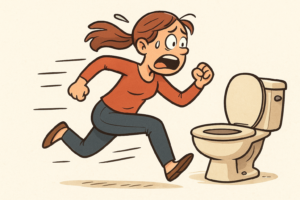You’re in the middle of an important meeting, stuck in Lagos traffic, or just too lazy to get up so you decide to “hold it” a little longer.
We’ve all been there. But while it might feel harmless, regularly ignoring your body’s call for a bathroom break can do more damage than you think. From infections to kidney strain, holding your pee too often is a habit worth breaking.
What happens when you hold pee too long.
Although delaying nature’s call for an hour or two won’t pose any threat to your body. But making a habit of holding your pee for too long may.
A healthy adult body can produce 2 cups of urine within 9 to 12 hours and can even stretch to hold more in the worst cases, which is about as long as one can wait and still be in the safe zone without damaging your organs. When you first feel the urge to urinate, the bladder still has plenty of time before it is completely full.

Your bladder is like a storage bag of urine; it’s only designed to hold liquid temporarily and not all day. When you delay going to the bathroom too often, you force your bladder to stretch beyond its comfortable capacity. This can weaken the bladder muscles over time, making it harder for your body to fully empty itself later. This habit can also lead to serious health problems such as urinary tract infections (UTIs), bladder damage, and even kidney issues. People with existing health conditions like diabetes or sickle cell anemia may be at higher risk, as they often experience frequent urination or difficulties in fully emptying their bladder. In such cases, holding in urine for long periods can worsen their symptoms and increase the chances of complications.
Under normal conditions, most adults urinate 6–7 times per day, though anywhere between 4 and 10 times can also be healthy depending on fluid intake and other factors. For women specifically, typical patterns range from 2 to 10 times during the day and 0 to 4 times at night. A healthy bladder usually lets you feel the urge at about 200–300 ml, with a maximum capacity of around 400–600 ml.
Pee table
| Category | Frequency per 24 Hours |
| Typical healthy adult | 6–7 times daily |
| Broader “normal” range | 4–10 times daily |
| Average day and night frequency | 5–6 times/day; no more than once nightly |
| Healthy women (day/night range) | 2–10 times/day; 0–4 times/night |
| Healthy bladder sign | 4–6 times/day; sensations at 200–300 ml; total capacity 400–600 ml |
Implications of frequently holding your pee for too long
When you delay using the bathroom often, your body pays the price in several serious ways. Here’s what can go wrong:
1. Increased Risk of Urinary Tract Infections (UTIs)
Holding urine allows harmful bacteria to multiply, increasing the likelihood of UTIs. A study among women found that habitual delay in urination was a significant risk factor for UTI, often due to poor access to clean toilets. Medical experts emphasize that frequent holding of urine raises bacterial growth in the bladder and harms urinary health.
2. Bladder Muscle Damage & Pelvic Floor Weakness
Regular overstretching weakens the bladder’s “stretch” nerves and muscles, making it harder for your body to sense fullness properly. Over time, this may lead to incomplete emptying or even incontinence. In extreme cases, the bladder can enlarge and lose elasticity, reducing its ability to contract efficiently.
3. Kidney Stress, Stones & Potential Infection
When urine backs up due to retention, it can flow backward toward the kidneys and cause damage. This increases the risk for kidney infections, kidney stones, and long-term kidney injury. In rare and severe circumstances, the bladder may rupture, leading to life-threatening complications like sepsis and kidney failure.
Sakinah Medical Outreach’s Message
At Sakinah Medical Outreach, our goal is to shine a light on simple yet vital health habits that can have a big impact on your well-being. Holding in your pee may seem harmless—but over time, it can increase your risk of infections, damage your bladder, and even affect your kidneys.
SMO urges everyone to listen to their body’s signals. Go when you need to go, stay hydrated, and protect your urinary health—one bathroom break at a time.
References
- Behavioral delay in urination was linked to higher UTI rates among women hostel residentsPMC.
- Holding urine increases bacterial growth and stress on the bladder and kidneysMedical News Today+1Sharp HealthCareNIDDK.
- Bladder overstretching can reduce muscle function or cause bladder enlargementHealthlineMedical News Today.
- Severe retention may lead to bladder rupture, sepsis, or kidney failureMedical News Today.
- Normal adult urination frequency and rangesMedical News TodayBladder & Bowel CommunityEatingWellVerywell HealthPMC.
